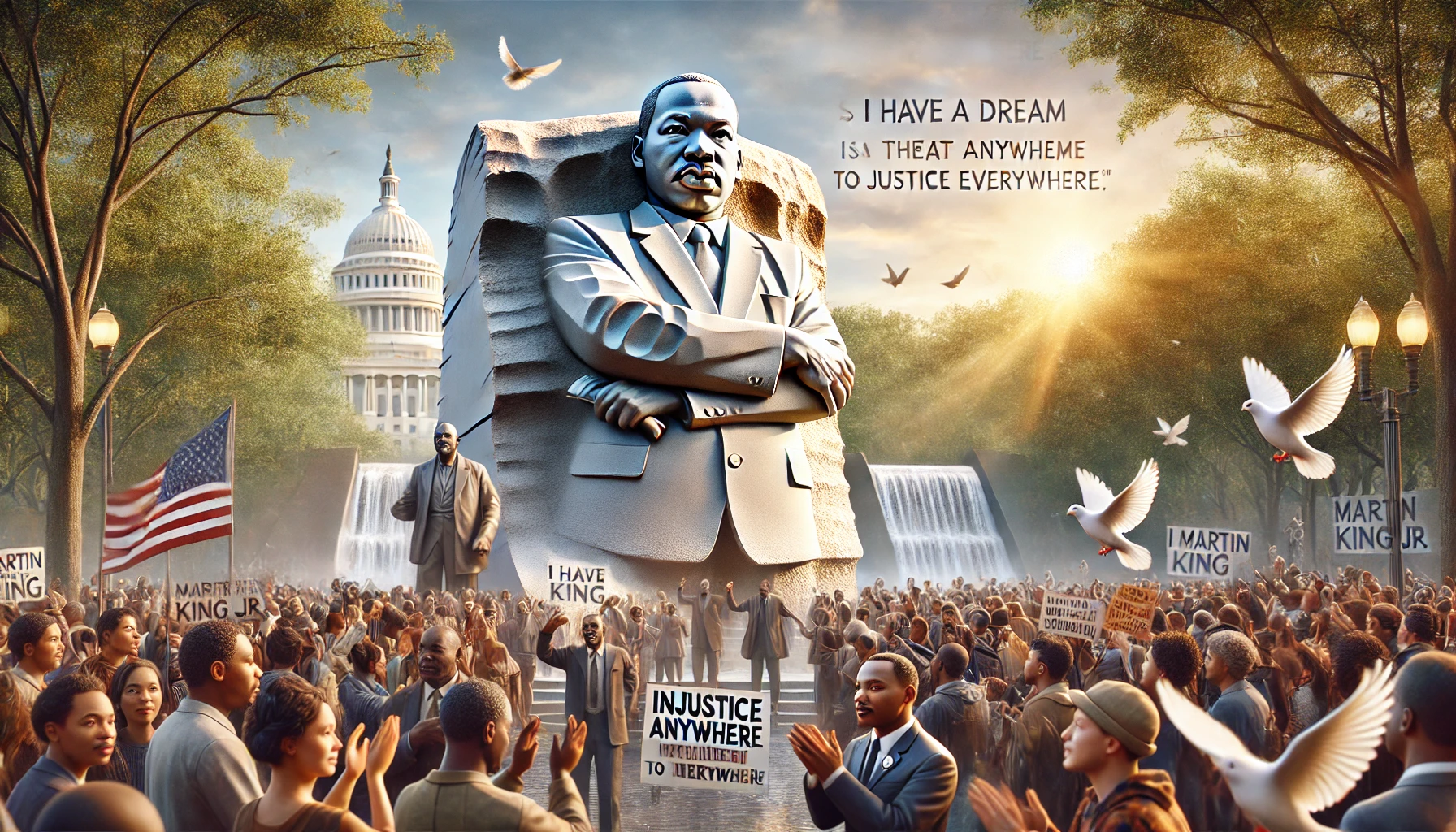Dr. Martin Luther King Jr. remains a beacon of hope, equality, and justice even decades after his passing. As the world continues to grapple with issues of racial inequality, his teachings and vision resonate more profoundly than ever. From his remarkable “I Have a Dream” speech to his peaceful activism, King’s legacy endures, influencing current movements for justice and equality.
The Life and Legacy of Dr. Martin Luther King Jr.
Dr. Martin Luther King Jr. was born on January 15, 1929, in Atlanta, Georgia. As a Baptist minister and civil rights leader, he devoted his life to advocating for nonviolent resistance and racial equality. His tireless efforts helped dismantle systemic racism in America, particularly through his leadership in the Montgomery Bus Boycott, the Birmingham Campaign, and the March on Washington.
King’s legacy is firmly rooted in his unwavering belief in justice and equality. His philosophy of nonviolence, inspired by Mahatma Gandhi, transformed the civil rights movement and inspired millions worldwide.
Why Dr. Martin Luther King Jr. Still Matters Today
The teachings of Dr. Martin Luther King Jr. are not confined to the past. They serve as a moral compass for addressing modern challenges. His message of peaceful resistance is increasingly relevant in today’s polarized world.
- Promoting Social Justice: King’s vision for a world free from prejudice continues to inspire activists and policymakers.
- Bridging Divides: His emphasis on dialogue and understanding offers a blueprint for resolving conflicts in a divided society.
- Fostering Global Equality: King’s advocacy for human rights extends beyond racial issues, influencing global movements for justice.
The Impact of “I Have a Dream” on Society
Delivered during the 1963 March on Washington, the “I Have a Dream” speech is one of King’s most iconic moments. It articulated a vision of racial harmony and equality that has inspired generations.
Key Takeaways from the Speech:
- A Vision for Equality: King envisioned a world where individuals are judged by their character, not their skin color.
- Unity Across Races: He emphasized the importance of people from all backgrounds coming together to achieve justice.
- A Call to Action: The speech remains a rallying cry for those fighting against injustice.
Dr. Martin Luther King Jr. and Nonviolent Resistance
One of the most defining aspects of King’s leadership was his commitment to nonviolence. He believed that love and understanding were more powerful than hate and division.
Principles of Nonviolence Advocated by King:
- Nonviolence is a way of life: It is not just a strategy but a philosophy of living.
- Seek reconciliation, not defeat: The goal is to build relationships, not destroy them.
- Fight injustice, not people: Focus on the systems of oppression, not the individuals perpetuating them.
- Suffering can educate and transform: Enduring hardship for the sake of justice can bring about change.
How Dr. Martin Luther King Jr. Influences Modern Movements
Dr. Martin Luther King Jr.’s impact on modern movements is undeniable. His teachings have become a cornerstone for activists worldwide.
Examples of His Influence:
- Peaceful Protests: Many current movements adopt King’s approach of nonviolent demonstrations to raise awareness.
- Legislative Advocacy: His success in influencing laws inspires today’s leaders to push for systemic change.
- Youth Engagement: King’s ability to mobilize young people serves as a model for engaging the next generation.
Dr. Martin Luther King Jr. and the Power of Unity
King understood that unity was essential for progress. He worked tirelessly to bring together people from diverse backgrounds to fight for a common cause.
Lessons on Unity from King:
- Empathy Builds Bridges: Understanding others’ experiences is key to fostering solidarity.
- Diversity Strengthens Movements: Collaboration among different groups creates a more powerful force for change.
- Shared Goals Drive Success: Focusing on common objectives can overcome differences.
The Role of Faith in Dr. Martin Luther King Jr.’s Leadership
Faith was a cornerstone of King’s activism. As a Baptist minister, he drew upon his religious beliefs to inspire hope and resilience.
Faith as a Source of Strength:
- Guided by Morality: King’s actions were rooted in his belief in divine justice.
- Inspiring Others: His sermons and speeches often included biblical references to motivate his followers.
- Enduring Adversity: Faith gave him the courage to face threats and challenges with grace.
Dr. Martin Luther King Jr. and the Civil Rights Act of 1964
King’s advocacy played a crucial role in the passage of the Civil Rights Act of 1964, a landmark piece of legislation that outlawed discrimination based on race, color, religion, sex, or national origin.
Significance of the Civil Rights Act:
- Legal Protections: It provided a framework for addressing racial inequality.
- Economic Opportunities: The act opened doors for marginalized communities.
- Cultural Shifts: It marked a turning point in America’s journey toward equality.
The Enduring Relevance of Dr. Martin Luther King Jr.’s Philosophy
King’s philosophy extends beyond the civil rights movement. His teachings offer guidance for addressing a range of societal issues, from poverty to climate change.
Applying King’s Philosophy Today:
- Advocating for Justice: Use peaceful methods to address inequalities.
- Building Inclusive Communities: Foster environments where everyone feels valued.
- Inspiring Change: Encourage others to take action for the greater good.
Dr. Martin Luther King Jr. in Popular Culture
King’s legacy has been immortalized in books, films, and songs. These portrayals help keep his message alive for new generations.
Notable Examples:
- Films: Documentaries like King: A Filmed Record capture his journey.
- Books: Works such as Strength to Love highlight his teachings.
- Songs: Musical tributes celebrate his contributions to humanity.
Lessons from Dr. Martin Luther King Jr. for Future Leaders
King’s leadership style offers valuable insights for aspiring leaders.
Leadership Principles from King:
- Lead with Integrity: Stay true to your values, even in the face of adversity.
- Empower Others: Encourage people to believe in their ability to make a difference.
- Communicate Effectively: Use words to inspire and unite.
The Global Impact of Dr. Martin Luther King Jr.
King’s influence extends far beyond the United States. His message of equality and justice resonates worldwide.
Examples of Global Influence:
- Anti-Apartheid Movement: King’s teachings inspired activists in South Africa.
- Peace Movements: His philosophy of nonviolence has been adopted by movements in India and beyond.
- International Human Rights: King’s legacy informs global efforts to promote dignity and equality.
Conclusion
Dr. Martin Luther King Jr.’s legacy is a testament to the power of hope, courage, and determination. His teachings continue to inspire individuals and movements worldwide, proving that one person’s vision can change the course of history. As we reflect on his life and work, let us strive to uphold the values he championed and work together to build a more just and equitable world.
FAQs
What was Dr. Martin Luther King Jr.’s most famous speech?
His “I Have a Dream” speech, delivered during the 1963 March on Washington, is his most iconic address.
How did Dr. Martin Luther King Jr. impact civil rights?
He led nonviolent protests, advocated for legislative changes, and inspired millions to fight for equality.
Why is Dr. Martin Luther King Jr. still relevant today?
His teachings on justice, unity, and nonviolence provide guidance for addressing modern societal challenges.
What was King’s philosophy of nonviolence?
It emphasized peaceful resistance, reconciliation, and focusing on systems of oppression rather than individuals.
How did faith influence Dr. Martin Luther King Jr.?
Faith was central to his activism, providing moral guidance and inspiring resilience.
What was King’s role in the Civil Rights Act of 1964?
His advocacy and leadership were instrumental in the passage of this landmark legislation.



